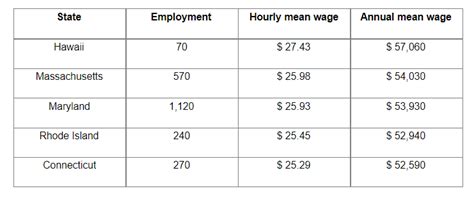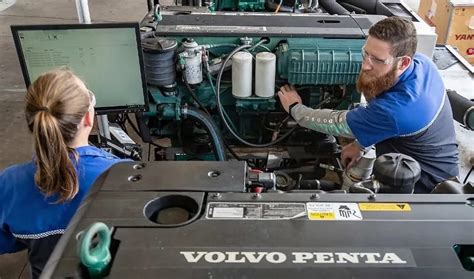For individuals who combine a passion for the open water with a knack for mechanics, a career as a marine technician is a perfect fit. This hands-on profession is essential to the multi-billion dollar recreational and commercial boating industry, ensuring vessels are safe, reliable, and efficient. But beyond the satisfaction of a well-tuned engine, what is the financial outlook for this career?
This article provides a data-driven analysis of marine technician salaries in the United States. While entry-level positions often start around the $40,000 mark, experienced and specialized technicians in high-demand areas can command salaries well over $75,000, showcasing significant growth potential for dedicated professionals.
What Does a Marine Technician Do?

A marine technician, often called a motorboat mechanic, is the expert responsible for the health of a boat's mechanical and electrical systems. They are problem-solvers who diagnose, repair, and maintain the complex machinery that powers everything from small fishing boats and luxury yachts to commercial workboats.
Their daily responsibilities typically include:
- Installing and repairing inboard and outboard engines.
- Servicing and troubleshooting steering, propulsion, and hydraulic systems.
- Diagnosing and fixing complex electrical issues, including navigation and communication equipment.
- Performing routine maintenance like oil changes, winterizations, and system inspections.
- Working with a variety of tools, from standard wrenches to advanced computer diagnostic software.
It’s a dynamic role that demands technical skill, attention to detail, and a continuous desire to learn about new technologies.
Average Marine Technician Salary

When analyzing salary data, it's important to look at multiple sources to get a complete picture. Government statistics provide a reliable baseline, while real-time salary aggregators reflect current market trends.
According to the U.S. Bureau of Labor Statistics (BLS), the median annual wage for "Motorboat Mechanics and Service Technicians" was $49,350 as of May 2023. This means half of all technicians earned more than this amount, and half earned less. The BLS also notes a broad range, with the lowest 10 percent earning less than $36,250 and the top 10 percent earning more than $77,410.
Reputable salary aggregators often report slightly higher figures, likely due to different data collection methods that capture a wide range of experience and specialization.
- Salary.com reports the median salary for a Marine Technician in the U.S. to be around $58,744, with a typical range falling between $50,581 and $67,067.
- Payscale estimates the average hourly wage at approximately $24.25, which translates to an annual salary of about $50,440.
- Glassdoor suggests a higher total pay average, often factoring in bonuses and other compensation, with a potential range between $57,000 and $88,000 per year.
In summary, a marine technician can expect a typical salary between $50,000 and $65,000, with significant opportunities to earn more based on several key factors.
Key Factors That Influence Salary

Your earning potential is not a fixed number. It’s a dynamic figure influenced by your skills, choices, and environment. Here are the five most significant factors that impact a marine technician's salary.
###
Level of Education and Certification
While a four-year college degree is not required, formal training and industry certifications are paramount for career advancement and higher pay. Technicians with a high school diploma and on-the-job training form the foundation of the industry. However, those who complete post-secondary programs at technical schools like the Marine Mechanics Institute (MMI) or earn certifications from the American Boat and Yacht Council (ABYC) are better positioned for higher earnings.
Most importantly, manufacturer-specific certifications from brands like Yamaha, Mercury Marine, Volvo Penta, or Caterpillar make a technician a valuable asset. A master-certified technician in a popular engine brand is one of the highest-paid professionals in the field.
###
Years of Experience
Experience is perhaps the single most critical factor in determining salary. As technicians gain hands-on expertise, their ability to diagnose complex problems quickly and efficiently grows, making them more valuable to employers.
- Entry-Level (0-2 years): Technicians are typically learning the fundamentals, assisting senior mechanics, and performing routine maintenance. Salaries are often in the $40,000 to $48,000 range.
- Mid-Career (3-8 years): With solid experience, these technicians can work independently, handle a wide range of repairs, and are trusted with more complex jobs. Their earnings align closely with the national median, typically $50,000 to $65,000.
- Senior/Master Technician (8+ years): These seasoned professionals often have multiple certifications, specialize in high-demand areas, and may take on supervisory roles. They command the highest salaries, frequently earning $65,000 to $75,000+ annually.
###
Geographic Location
Where you work matters. Salaries for marine technicians are highest in areas with a high concentration of recreational and commercial boats, a strong marine industry, and a higher cost of living. Coastal states naturally lead the way.
Top-paying states and regions include:
- Florida: The epicenter of the U.S. boating world, with countless marinas, dealerships, and private yachts.
- California: A massive coastline and a large number of high-end vessels create strong demand.
- Washington: A hub for both recreational boating and commercial fishing fleets.
- Northeast States: Areas like Maryland, Massachusetts, and Connecticut have robust boating seasons and a high density of boats requiring service.
Conversely, technicians in inland states with smaller boating communities may see salaries closer to the lower end of the national average.
###
Company Type
The type of facility you work for directly impacts your compensation structure and overall earnings.
- Large Boat Dealerships and Service Centers: These employers often offer structured pay, benefits packages, and clear paths for manufacturer-sponsored training and certification.
- Independent Marinas and Repair Shops: These can offer a more varied work environment. While base pay might be slightly lower than at a large dealership, there may be opportunities for overtime during peak season.
- Yacht Management Companies / Private Owners: Working as a dedicated technician or engineer on a superyacht represents the pinnacle of earning potential in this field. These roles demand the highest level of skill, discretion, and experience, and often come with six-figure salaries and benefits like travel and accommodations.
###
Area of Specialization
Generalists are always needed, but specialists command premium pay. Developing deep expertise in a high-demand niche can significantly boost your salary.
High-value specializations include:
- Marine Diesel Engines: Large yachts and commercial vessels rely on powerful diesel engines, and skilled diesel technicians are always in high demand.
- Advanced Marine Electronics: As boats become "smarter," technicians who can install, integrate, and troubleshoot complex navigation, communication, and onboard automation systems are invaluable.
- Outboard Engine Technology: Modern four-stroke and direct-injection outboard engines are highly complex, and certified technicians are highly sought after by dealerships and boaters alike.
- Fiberglass and Gelcoat Repair: This is more of an artisan skill, and experts who can perform seamless structural and cosmetic hull repairs are well-compensated.
Job Outlook

The career outlook for marine technicians is stable. According to the U.S. Bureau of Labor Statistics, employment in this field is projected to show little or no change from 2022 to 2032.
However, this statistic doesn't tell the whole story. The BLS also projects about 2,900 openings for motorboat mechanics and service technicians each year, on average, over the decade. Most of these openings will result from the need to replace workers who retire or transfer to other occupations. The increasing complexity of modern boats ensures that the demand for skilled, well-trained technicians will remain constant, especially for those with up-to-date electronic and computer diagnostic skills.
Conclusion

A career as a marine technician offers a direct and rewarding path for mechanically inclined individuals. While the median salary provides a solid living, the real story is one of opportunity. Your earning potential is not fixed—it is a reflection of your commitment to the craft.
For those considering this field, the key takeaways are clear:
1. Invest in Your Skills: Pursue formal training and aim for manufacturer and ABYC certifications.
2. Gain Diverse Experience: Work on a variety of systems and engine types to become a versatile problem-solver.
3. Find Your Niche: Specializing in a high-demand area like diesel engines or marine electronics will unlock the highest salary potential.
4. Be Strategic About Location: Consider moving to a coastal area with a thriving marine industry to maximize your opportunities.
By charting a course built on continuous learning and specialization, you can navigate your way to a prosperous and highly satisfying career keeping the world's boats on the water.
